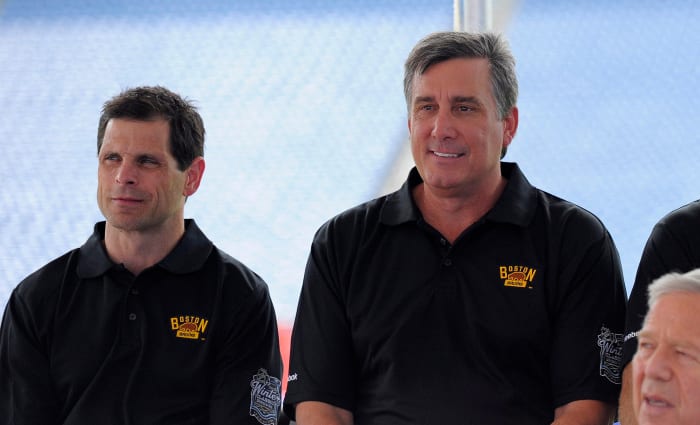This is the latest edition of The THN Hot Seat, a daily series of THN.com columns where we identify one person in each NHL city who will be dealing with major pressure in the 2022-23 regular season. The Hot Seat nominee could be an NHL player, coach, or franchise owner. Today, we’re looking at the Boston Bruins.
BRUINS HOT SEAT: (tie) DON SWEENEY, GM, AND CAM NEELY, PRESIDENT
WHY: The Bruins have made the post-season every year for the past six years, and that’s a credit to the management tandem of Neely and Sweeney, who have worked together in their respective roles since 2015. But Stanley Cup success has eluded them, and last season, they were eliminated in the opening round of the playoffs for the first time since 2016-17. There’s a sense the franchise is dealing with the law of diminishing returns, which may be why Neely and Sweeney chose to dismiss longtime head coach Bruce Cassidy this summer, replacing him with former Dallas Stars bench boss Jim Montgomery.
Boston’s core of talent at forward is mostly in their thirties – and that’s not including centers Patrice Bergeron (37) and David Krejci (36), both of whom are believed to be returning to the Bruins on one-year contracts for the 2022-23 season. campaign. The problem for Sweeney is that the Bruins only have $4.7 million in salary cap space, and while that issue will be temporarily alleviated because star winger Brad Marchand and elite defenseman Charlie McAvoy are both sidelined for the first couple months of the regular season, that also means Boston will be noticeably hamstrung talent-wise in a noticeably more competitive Atlantic Division.
By making Cassidy take the fall for a disappointing year, Neely and Sweeney are putting themselves in the crosshairs if Boston again goes out early in the post-season – or, even worse, fails to make the playoffs at all. Sweeney has signed a multi-year contract extension, but the Jacobs clan that owns the team has the financial wherewithal to absorb that deal if there’s a huge on-ice letdown from the team. And with Atlantic teams like the Ottawa Senators and Detroit Red Wings poised to nip at the Bruins’ heels in the standings, that’s a very real possibility.
Something else to consider: even if Bergeron and Krejci do come back this season, there’s no assurance they’ll play in the 2023-24 season, and next summer, Sweeney has a slew of unrestricted free agent forwards, including star winger David Pastrnak, and veterans Nick Foligno, Craig Smith, Tomas Nosek and Chris Wagner. Let’s say, for argument’s sake, Sweeney re-signs Pastrnak, likely on a healthy raise from the $6.6 million he’s earning this coming year. Boston is projected to have $25.4 million in cap space next summer, but take off at least $9 million of that for Pastrnak, and you’ll have 14 players under contract, and $16.4 million in cap space. That leaves less than $2.5 million (on average) per player to fill out the roster. (And again, that’s without new paydays for Bergeron and Krejci, if they wish to continue playing.) That means Boston probably won’t be a big-time player on the free agent or trade fronts.
At that point, what do Neely and Sweeney do? They can’t fault the coach for a second consecutive season. They don’t have anywhere close to the NHL’s best pool of prospects to provide cheap labor. Four of their blueliners will be at least 29 years old by then. All-in-all, it seems like a period of retraction on the horizon in Boston, and Bruins fans accustomed to perennially making the playoffs could be in for a painful reality check.
Boston has too much talent to be a bottom-feeder next season, but fewer and fewer people project them to be a legitimate Cup contender. Their competitive window is shrinking – something that happens to virtually every successful franchise – and the blame game may soon center around Sweeney and Neely.
.
